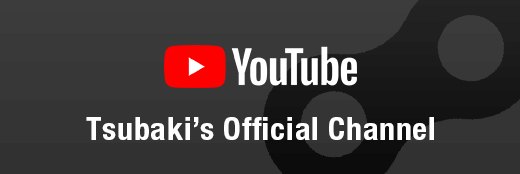Supply Chain Management (Business Partners)
Basic Concept
In order to perform high-quality manufacturing and contribute to a sustainable society, the Tsubaki Group is working to strengthen our cooperation with partner companies (suppliers). Based on fair and equitable dealings, and through procurement activities that take into consideration our social responsibilities including environmental conservation, the respect of human rights, and compliance, we will continue contributing to realizing a sustainable society and strengthening partnerships.
Basic Procurement Policy
The following is our Basic Procurement Policy:
1. Fair and Equitable Dealings
We provide open, fair, and equitable opportunities to suppliers inside and outside Japan wishing to conduct business with us.
In selecting suppliers, we will take into consideration quality, cost, delivery schedules, the ability of the supplier to provide a stable supply, technological strength and know-how, the financial position of the supplier, and other factors.
2. Developing Relationships of Mutual Trust
We respect free competition and aim to build deeper relationships of trust with all our suppliers through fair business transactions.
3. Promotion of Developmental Procurement
We promote developmental procurement in order to cooperate with our suppliers in reducing costs as much as possible. We welcome and evaluate new proposals from suppliers who wish to provide their extensive and specialized knowledge and know-how, new technologies and products.
4. Legal Compliance (Safeguarding of Confidential Information)
We comply with all laws and regulations related to procurement in both letter and spirit. We do not disclose any sales or technical information we receive in the course of our procurement activities with suppliers to third parties without the consent of the supplier.
5. Prioritizing the Environment (Green Procurement)
We understand that the conservation of the Earth’s environment is one of the highest priorities for mankind. It is our basic policy to procure environmentally friendly materials.
6. Conflict Minerals
In order to fulfill our corporate social responsibility in procurement activities, we will cooperate with our suppliers to ensure transparency in the supply chain and avoid the use of conflict minerals as a financial resource for armed groups, in accordance with Article 1502 of the Financial Regulatory Reform Act (Dodd-Frank Act) enacted in the United States in July 2010.
Established: December 11, 2006
Revised: April 1, 2020
Cooperation with Suppliers
The Tsubaki Group has fulfilled its social responsibilities as a company while simultaneously advancing company-wide efforts to solve social issues by strengthening our response to a variety of business continuity risks and promoting technological innovation. Going forward, we will aim to be a company that meets the expectations of all stakeholders, and contribute to the resolution of societal challenges through our business endeavors while working to achieve the higher goal of contributing to the construction of a sustainable society.
At the same time, with the globalization of corporate activities, our supply chain has expanded across the world for procurement of products, raw materials, and other materials, highlighting the limits of what can be achieved by the CSR activities of a single company alone. For this reason, the Tsubaki Group is carrying out a wide range of activities in collaboration with our suppliers, including measures to combat climate change and initiatives for respect of human rights.
Regarding conflict minerals, our policy is defined in the Basic Procurement Policy, and in accordance with guidance manuals on investigating conflict minerals, we request that the suppliers concerned carry out investigations, and we complete and publish a Conflict Minerals Reporting Template.
Principal Initiatives
1. Initiatives for Sustainable Procurement
In order to realize a sustainable society, it is essential to engage in sustainability efforts throughout the entire supply chain. We established the Tsubaki Group Supplier Sustainability Guidelines in 2020 to further promote collaboration with our suppliers. We distribute these Guidelines to our major suppliers and ask them to commit to sustainable procurement throughout their supply chains.
Flow of Sustainable Procurement Activities

Distribution of Sustainability Guidelines for Suppliers
We have collected and distributed the sustainability items that we want our suppliers to observe in the Tsubaki Group Supplier Sustainability Guidelines. The contents of these Guidelines are also explained at procurement policy briefings and other opportunities.
-
Number of Sustainability Guidelines issued (cumulative total)
FY 2022 FY 2023 FY 2024 Number of Sustainability Guidelines issued (cumulative total) 1,050 1,509 1,611 -
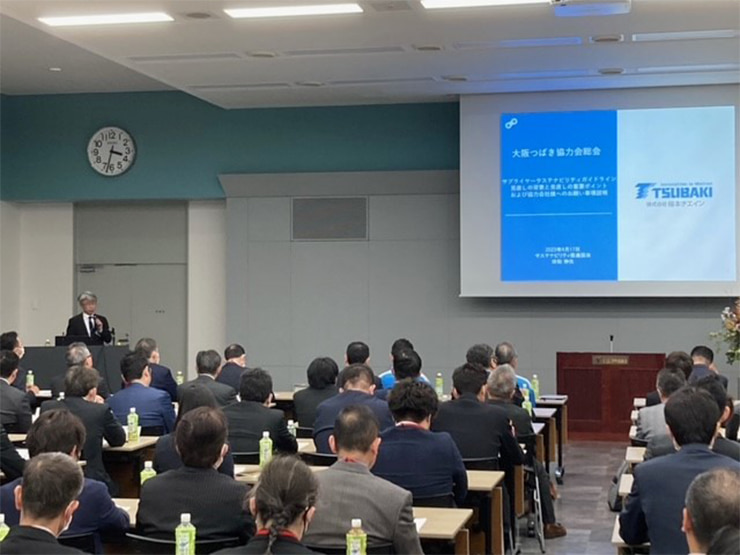
Briefing on the revised Supplier Sustainability Guidelines
Sustainability Activities, and Training and Evaluation Activities Related to Respect for Human Rights
We conduct online and offline seminars to introduce the sustainability activities required of a corporation, an overview of the Tsubaki Group Supplier Sustainability Guidelines, initiatives for respect of human rights that corporations should observe, and other matters.
Beginning from FY 2023, we are conducting an online survey to check the status of sustainability activities and we have implemented self-assessment questionnaire (SAQ) and human rights due diligence as online survey for our major suppliers to check the status of their sustainability and human rights respect practices. The results of the FY 2024 questionnaire did not reveal any serious concerns, although there were ascertained to be relatively few initiatives relating to environmental activities—for example, reducing CO2 emissions—and to systems at the time of emergencies such as natural disasters.
We will gradually expand the scope of the survey and provide support to resolve issues found in it.
-
Number of companies responding to the SAQ and survey for due diligence regarding human rights
FY 2023 FY 2024 SAQ
(survey of sustainability activity status)171 (69.5%) 349 (81.7%) Due diligence regarding human rights 191 (77.6%) 349 (81.7%) * Figures in parentheses ( ) are response rates.
-
Online training materials

2. Carbon Neutrality Initiatives
The Tsubaki Group recognizes that addressing climate change is an important issue for all of humanity, and is carrying out CO2 reduction activities aiming to achieve carbon neutrality in 2050. These initiatives also require that CO2 emissions throughout the supply chain be made visible, and that activities to reduce them be carried out.
For years, the Group has communicated information to suppliers and identified the status of their activities. In the future, we will take further steps and collaborate with our major suppliers in their reduction activities, and will reinforce the activities aimed at achieving carbon neutrality.
Communicating Information Related to Carbon Neutrality
At procurement policy briefings and other opportunities, we introduce the global situation related to carbon neutrality and our activities for reducing CO2 emissions. We also provide online videos explaining how we calculate CO2 emissions, effective reduction activities, and other matters, and provide support for the activities of major suppliers.
-

Online learning video
"Efforts to combat global warming: GHG emissions calculation method" -

Online learning video
"Efforts to combat global warming: Case studies of emissions reduction"
Introduction of CO2 Emissions Investigation (Scope 1 + 2) and Reduction Activities (Plant Tours)
We have been conducting CO2 emissions surveys since FY 2023 for suppliers with high energy consumption, such as material manufacturers and metal processing manufacturers.
We also collaborate with our suppliers, who are among the highest CO2 emitters surveyed, on CO2 reduction efforts. As a part of these activities, since FY 2023, we have conducted plant tours aimed at introducing our company’s CO2 reduction activities. Going forward, we plan to conduct energy efficiency audits and hold information sharing meetings on CO2 emissions reduction.
Via such activities, we will further strengthen cooperation with suppliers in working to identify and reduce CO2 emissions throughout the supply chain.
-
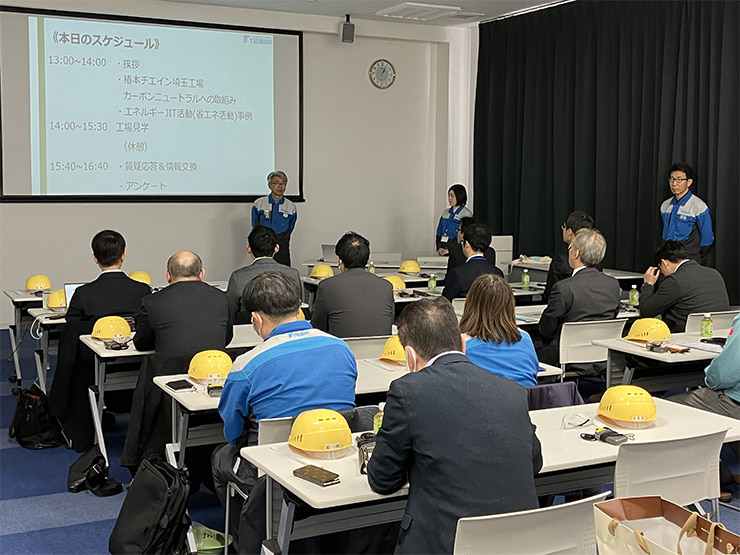
Introducing an overview of the Saitama Plant and CO2 reduction activities -
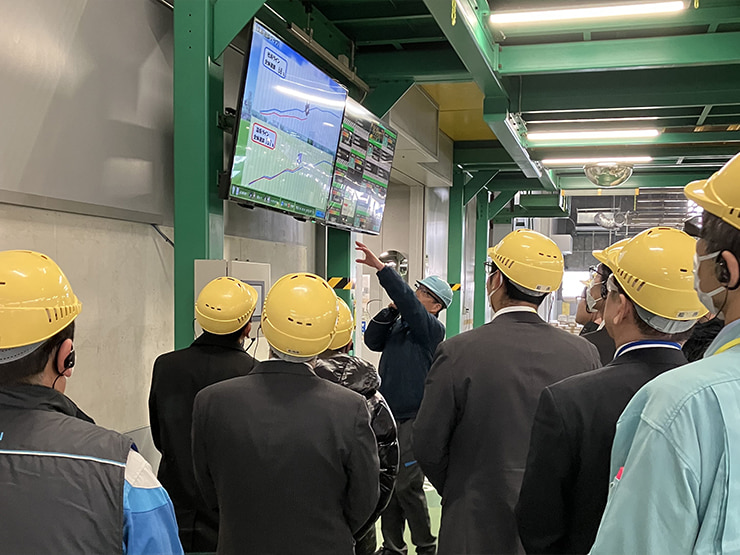
Introducing specific activities of manufacturing workplaces during plant tours
Promotion of Green Procurement
We established our Green Procurement Guidelines in 2006 and have worked together with suppliers to promote activities for purchasing materials and components with low environmental impact. We revised these guidelines in 2021 in order to take a more assertive approach to emissions reduction initiatives. We have requested that suppliers proactively observe them and carry out continual improvements.
3. Implementation of Sustainable Training for Procurement Staff
At the Tsubaki Techno School, level-specific training, and training sessions at Group companies, we formulate programs and carry out education on topics that include approaches to sustainability (CSR and CSV), demands from international society, and Group initiatives.
4. Support for and Participation in Initiatives
Endorsement of the Declaration of Partnership Building
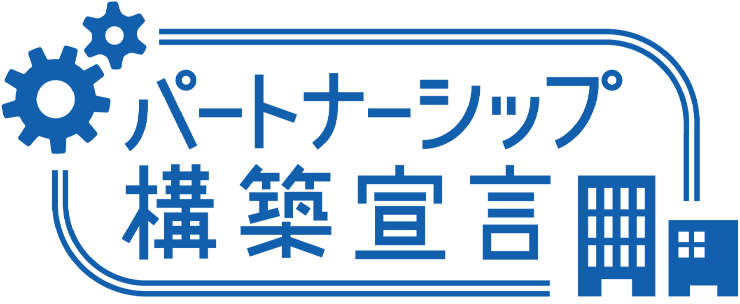
We have been registered in the Declaration of Partnership Building, which is sponsored by the Cabinet Office, The Small and Medium Enterprise Agency, the Keidanren (Japanese Business Federation), and other government agencies. The Declaration of Partnership Building aims for partnership, coexistence, and coprosperity across the supply chain.
In this system, a declaration is issued in the name of the representative to encourage coexistence and mutual prosperity throughout the entire supply chain and to adhere to recommended and preferred transaction practices. The declaration by the Tsubaki Group encompasses aspects like enhancing information security, reducing CO2 emissions, fortifying partnerships, and augmenting value across the complete supply chain.
Web Portal of the Declaration of Partnership Building
Click here for the Tsubaki Group’s Declaration of Partnership Building (PDF) *Japanese version
Participation in the Global Compact Network Japan
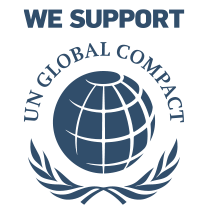
In April 2022, we signed the United Nations Global Compact (UNGC) and took part in the supply chain section meeting of Japan’s local network, the Global Compact Network Japan (GCNJ).
The GCNJ is a platform for member companies and organizations to jointly promote sustainability initiatives. In the supply chain section meeting, participating companies across industries are able to strengthen their horizontal business ties and work to spread sustainable procurement in society.


